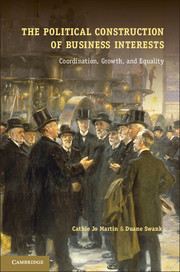Book contents
- Frontmatter
- Contents
- Figures
- Tables
- Acknowledgments
- Introduction
- 1 Collective Political Engagement and the Welfare State
- 2 The Political Origins of Coordinated Capitalism
- 3 Party Conflict and the Origins of Danish Labor Market Coordination
- 4 British Experiments in National Employers’ Organization
- 5 Sectional Parties and Divided Business in the United States
- 6 The Origins of Sector Coordination in Germany
- 7 Twenty-First Century Breakdown? Challenges to Coordination in the Postindustrial Age
- 8 Institutional Sources of Employers’ Preferences for Social Policy
- 9 Employers, Coordination, and Active Labor Market Policy in Postindustrial Denmark
- 10 Employers and Active Labor Market Policy in Postindustrial Britain
- 11 The Failure of Coordination and the Rise of Dualism in Germany
- 12 The Political Foundations of Redistribution and Equality
- Conclusion Social Solidarity after the Crisis of Finance Capitalism
- Bibliography
- Index
9 - Employers, Coordination, and Active Labor Market Policy in Postindustrial Denmark
Published online by Cambridge University Press: 05 June 2012
- Frontmatter
- Contents
- Figures
- Tables
- Acknowledgments
- Introduction
- 1 Collective Political Engagement and the Welfare State
- 2 The Political Origins of Coordinated Capitalism
- 3 Party Conflict and the Origins of Danish Labor Market Coordination
- 4 British Experiments in National Employers’ Organization
- 5 Sectional Parties and Divided Business in the United States
- 6 The Origins of Sector Coordination in Germany
- 7 Twenty-First Century Breakdown? Challenges to Coordination in the Postindustrial Age
- 8 Institutional Sources of Employers’ Preferences for Social Policy
- 9 Employers, Coordination, and Active Labor Market Policy in Postindustrial Denmark
- 10 Employers and Active Labor Market Policy in Postindustrial Britain
- 11 The Failure of Coordination and the Rise of Dualism in Germany
- 12 The Political Foundations of Redistribution and Equality
- Conclusion Social Solidarity after the Crisis of Finance Capitalism
- Bibliography
- Index
Summary
Introduction
In the Pantheon of European social experiments, Denmark has a privileged position. As a small open economy competing in increasingly hostile global markets, one might expect Denmark to sacrifice equality to sustain growth and employment, or to see unemployment soar due to dogged commitment to equality. Yet, it enjoys an extremely low rate of inequality and a very high GDP per capita. Danish workers receive high unemployment benefits – about 48 percent of previous earnings, compared with 24 percent in Germany, 12 percent in the United Kingdom, and 14 percent in the United States – yet unemployment is generally low. In 2009, Denmark had 6 percent unemployment – compared with 8 percent in Germany and the United Kingdom – and only 9 percent of total unemployment was considered “long-term,” compared with 45 percent in Germany and 25 percent in the United Kingdom. Granted, the country has experienced declining economic, employment and productivity growth rates since the global financial crisis; however, the economic malaise reflects problems associated with the neoliberal deregulation of housing mortgages rather than with social democratic investments in workers’ skills. It is too early to make predictions, yet from a comparative perspective, Denmark seems poised largely to persevere in addressing the skills and employment status of marginal workers.
Our puzzle is to ascertain how the Danes have sustained a commitment to social solidarity in the face of global pressures, neoliberal ideas, significant periods of right-party control, and the torments of life in the twenty-first century. With spiraling rates of unemployment and budgetary distress, Denmark was “on the edge of an abyss” in 1979, according to the Social Democratic Minister of Finance; subsequently, both bourgeois and social democratic coalition governments adopted neoliberal regulatory and social reforms, such as scaling back passive supports for the long-term unemployment. These changes led scholars to question whether Denmark would maintain universal welfare benefits, and similar pressures provoked Germany to protect core workers but largely to abandon the peripheral long-term unemployed. Yet, Danish policy makers struggled to keep everybody on the employment bus and a remarkable coalition for social solidarity defeated dualism.
- Type
- Chapter
- Information
- The Political Construction of Business InterestsCoordination, Growth, and Equality, pp. 170 - 188Publisher: Cambridge University PressPrint publication year: 2012

